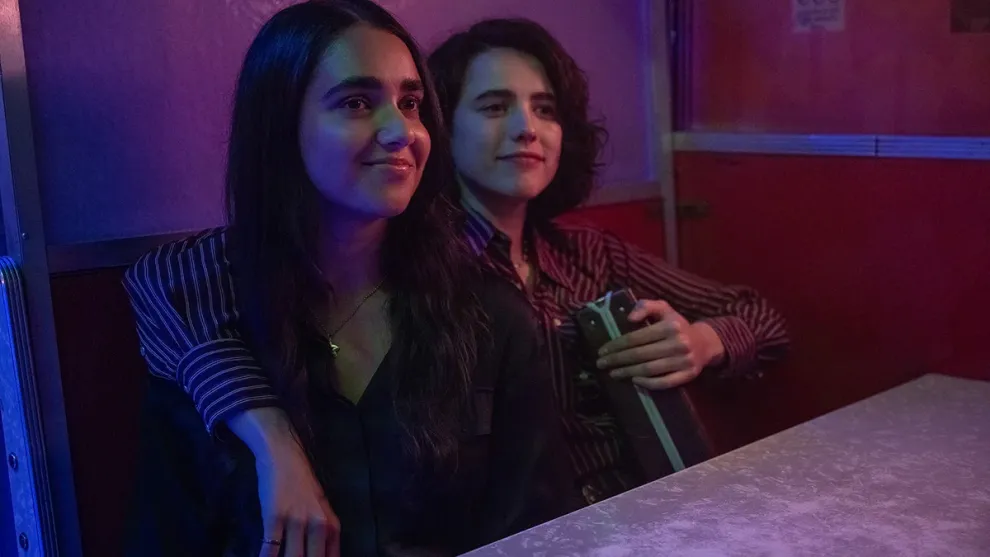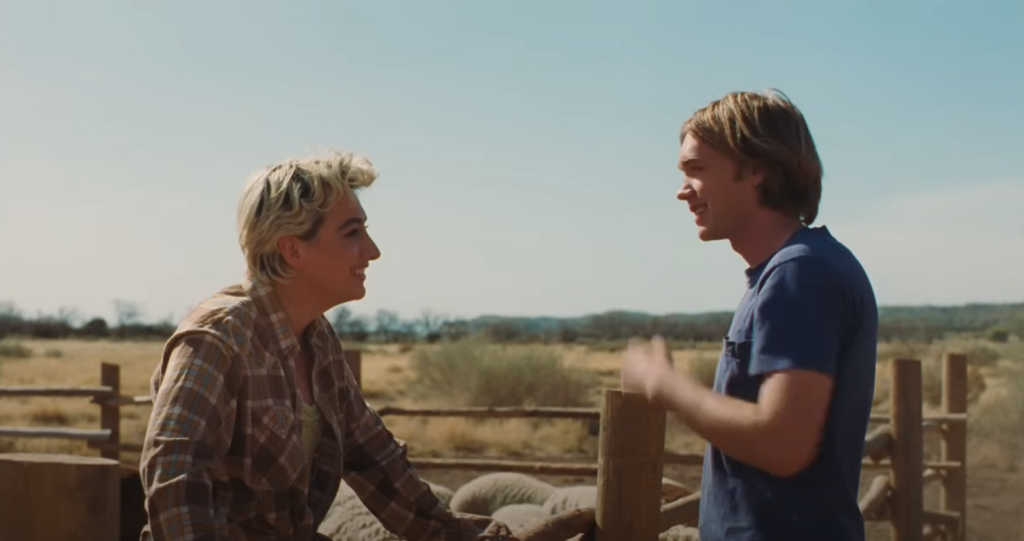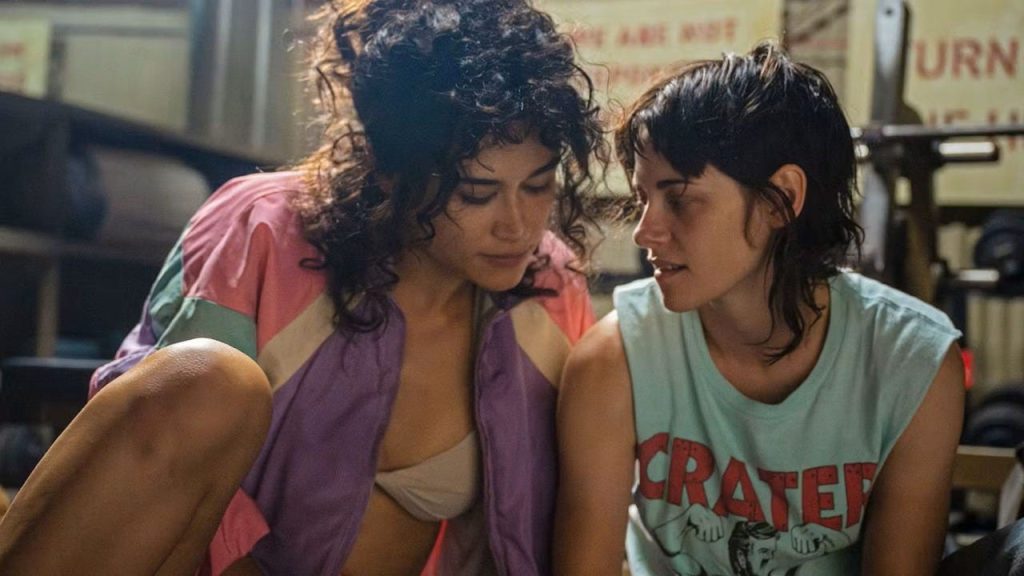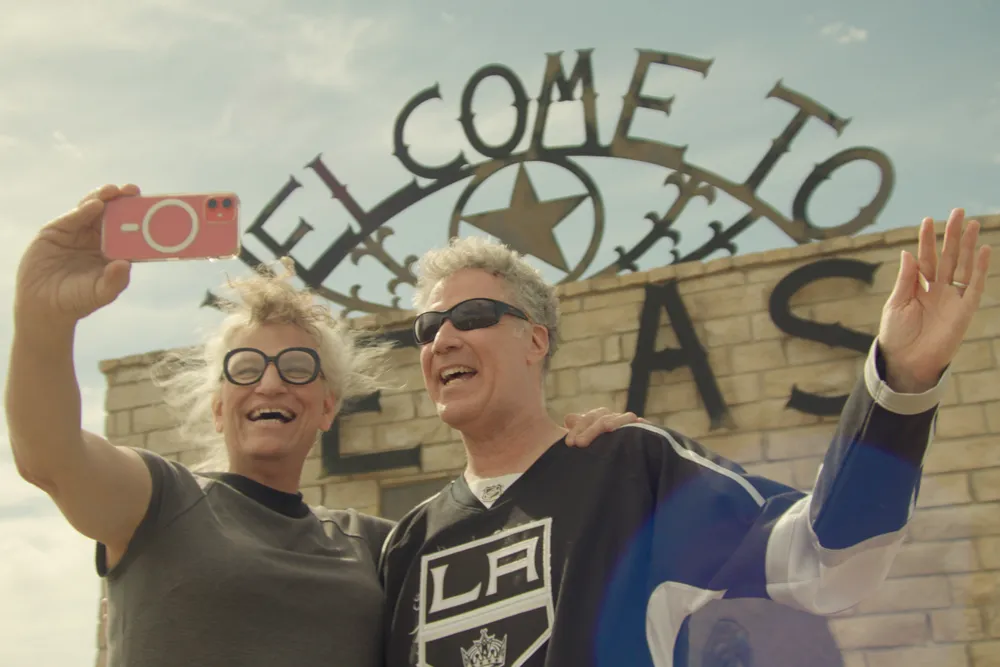Drive-Away Dolls is a silly, campy, very queer shaggy-dog of a movie from a very unexpected source – Ethan Coen, making his first fiction film without brother Joel.
Okay, it’s not a total departure – it’s got a road trip caper, daffy hard-boiled dialogue, unexpectedly blunt violence, and a ridiculous MacGuffin fueling the plot. But it also has a queer sensibility never seen in a Coen Brothers movie.
Plus, its real title (the title onscreen), is Henry James’ Drive-Away Dykes. Let’s agree to always think of it that way, if only in our heads.
So Why Would Midlife Queer Review Drive-Away Dolls?
Drive-Away Dolls is not about middle-aged queers. It’s about two young lesbians on a road trip in 1999.
But Drive-Away Dolls is made by a middle-aged queer couple. And they’re bringing a wave of nostalgia that sweeps up the 60s, 70s, 80s, and 90s in its wake.
Coen co-wrote Drive-Away Dolls with his wife, Tricia Cooke (previously editor on many of the brothers’ movies), and the new writing partner could not be more welcome. Cooke identifies as a queer lesbian, and she and Coen talk openly in interviews about their non-traditional, polyamorous partnership.
So it’s Cooke’s sensibility that brings the unapologetically sapphic raunchiness. As she said in an interview, “I kind of represent the queer world. All of the bumbling men in the movie and all of the caper stuff definitely comes from Ethan’s mind.” And Coen admits, “Me and Joel couldn’t do [the movie] because we’re both straight and stupid.”
Both of them refer to Drive-Away Dolls explicitly as a “B-movie,” a lesson in setting themselves free to have a trashy good time. It’s a delirious pastiche, and like some of the Coens’ more oddball movies (The Ladykillers, Burn After Reading, Hail, Caesar!), some parts work better than others.
But what works is a damn good time.
What Works in Drive-Away Dolls?
The cast, especially Margaret Qualley, Geraldine Viswanathan, and Beanie Feldstein.
As Jamie, Qualley is brash, oozing confidence, and a shameless hot mess. She’s out, loud, and delusionally proud.
Viswanathan makes uptight Marian into a sweet, deep, autistic-coded lovebug. Like Jamie, I feel absolutely bound by the universe to protect Marian at all costs.
And Feldstein, as Jamie’s bitter ex, steals absolutely every scene she’s in, whether she’s frantically removing a dildo from the wall, or confidently choking out a hired goon while his partner in crime tries to talk her down.
Throw in some goofy supporting turns from Colman Domingo, C.J. Wilson, Joey Slotnick, and Matt Damon – the aforementioned bumbling men – and Drive-Away Dolls has a cast that elevates the schtick.
As far as I’m concerned,[Coen and Cooke] can keep channeling their queer poly love into gleefully trashy, dumb fun for the rest of their career.
The dialogue, because duh, it’s Ethan Coen.
When Jamie proclaims herself to be from “where the Bible Belt meets the ass crack of the Pecos,” you know you’re watching a Coen movie. I found myself just writing down non-sequiturs: “Fuckity fuck.” “Dick yank.” “Anyhoo.” “Pussy promise.” “Will anybody save Curlie?”
The goons (Wilson and Slotnick) chasing Jamie and Marian bicker like the reluctant lovers in a 1930s screwball comedy – which, it turns out, is kind of apropos.
And Colman Domingo kills with a farcical monologue that begins “Ladies, you’re a day late and a dick short.”
What sets Drive-Away Dolls apart from the standard Coen brothers movie, though, is the incredibly frank, deliciously filthy lines that Qualley delivers in an accent that is part her mother (eternal gift to cinema Andie MacDowell) and part Yosemite Sam. She chews up and spits out Coen-style dialogue with the gusto of Holly Hunter or Jennifer Jason Leigh (the Coen Brother’s all-time best fast-talking gals).
I have to hand that to Cooke, unless Ethan Coen can channel the voice and experience of his lesbian wife – and hell, after 30 years together, maybe he can.
The incidental details.
- A chihuahua named Alice B. Toklas.
- A rural lesbian bar called “The Butter Churn.”
- And another called “The She Shed” – a term that definitely didn’t exist in 1999.
- A completely unexpected Miley Cyrus cameo.
- The briefcase. And the contents of the briefcase. (There’s going to be a spoiler later. Brace yourself.)
- The bizarre transitions (I know this one has been divisive with critics. But “jazzing up” the transitions for no reason at all is its own justification).
What Doesn’t Work in Drive-Away Dolls?
The plot, honestly.
The Coen brothers have made aimless picaresque a signature, but Drive-Away Dolls is shaggy even by Big Lebowski standards.
The hang-out plot sees Jamie ready for a change, after ex Sukie feels burned one too many times by her infidelity, and hitching a ride with Marian to Tallahassee.
In true drive-in sexploitation style, Jamie’s main objective is to hit up every lesbian bar from Philly to Florida (a journey based on Cooke’s own adventures in the 90s) and get Marian laid.
Unfortunately, they’re being tailed by two idiot hoods who want the contents of their rental car’s trunk. There, Coen and Cooke somehow find the intersection between Bring Me the Head of Alfredo Garcia and Pulp Fiction, but with dildos. (That’s not the spoiler. Stay on guard.)
Until the two plots converge, though, I couldn’t help but feel ripped out of the more entertaining quest every time we came back to the caper. The crime half of this crime comedy often feels like it’s intruding.
The fact that the actual criminal plot wraps up so quickly tells me Coen and Cooke felt the same way. Just get all this macho nastiness out of the way to hang out with Jamie and Marian!
So is Drive-Away Dolls Worth Seeing?
Have you been fucking listening? Of course it is!
With its 1999 setting (“Why not 2k?” as Jamie asks) and loving depiction of lesbian bars, Drive-Away Dolls works best as a sort of nostalgic fantasy of certain era of queer life. Ironically, Coen and Cooke couldn’t get the movie made 20 years ago – when it would have been contemporary – because no studio wanted to finance a funky lesbian farce with a happy ending.
It’s also not a political movie, per se. Coen says, “It’s a movie kind of with nothing on its mind, but also with everything on its mind.” (Here comes the spoiler. You were warned.) But seeing a conservative Christian senator brought down by a severed head and a briefcase full of dicks – it’s poetic justice I think everyone in the target audience can get behind.
All in all, Henry James’ Drive-Away Dykes owes more to its influences than it really lives up to: the subversive queer energy of John Waters and Pedro Almodóvar; Roger Corman and Russ Meyer; Faster, Pussycat! Kill! Kill! and Beyond the Valley of the Dolls.
But that’s okay. Let Joel make all the Shakespeare adaptations he wants. Shakespeare would have fucking loved “The Butter Churn.”
Honestly, I’m looking forward to the rest of Coen and Cooke’s lesbian B-movie trilogy (installment #2 is supposedly called Honey, Don’t). As far as I’m concerned, these two can keep channeling their queer poly love into gleefully trashy, dumb fun for the rest of their career. They’ve earned it and I dig it.
Related:



